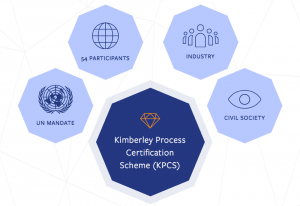No products in the cart.
Investment Diamonds
INVESTMENT DIAMONDS A grading report is mandatory for investment diamonds. Of course buyers need to know that a...
In the late 1990s the Sierra Leone and Angola civil wars put the issue of conflict diamonds at the forefront of global consciousness. The broader jewellery industry was unfairly demonised as contributing to these conflicts, but nonetheless, the industry as a collective took a firm stand against conflict diamonds by passing a resolution that changed the diamond trade forever and introducing diamond tracking.
The Kimberley Process Certification Scheme was the first-ever proposed by an industry body and was passed by the United Nations General Assembly in 2003. This significant, game-changing resolution brought industry, governments, and civil society together to crack down on the illegal conflict diamond trade, responsible for funding civil conflicts in the developing world.
According to the World Diamond Council, today more than 99 percent of the world’s diamonds are from conflict-free sources. This is largely due to the fact that the majority of the world’s diamonds are now officially traded under the aforementioned Kimberley Process Certification Scheme.

Kimberley Process Certification Structure
Any diamond traded under the mandated Kimberley Process is considered an ethical diamond, and since most of the world’s diamonds come from countries signed up to the process, the likelihood of an Australian buyer coming in contact with a conflict diamond is unlikely compared to 15 years ago.
The World Diamond Council states, “today 74 governments involved in diamond mining or cutting have enshrined into their national law the Kimberley Process Certification System, and now more than 99% of the world’s diamonds are from conflict-free sources. However, even one conflict diamond is one too many. The diamond industry continues to work with governments, NGOs and the UN to strengthen the Kimberley Process and the System of Warranties. KIMBERLEY PROCESS WEBSITE
So how are you supposed to know if the diamond ring you are buying is Kimberly Process compliant? All you need to do is ask your dealer, and they should be able to provide you with a written statement. Holloway Diamonds is the only Australian jeweller to have undergone the Responsible Jewellery Council audit and certification that was set up by leading miners and international brands to ensure the highest ethics within the jewellery industry. We are also members and sponsors of the Diamond Development Initiative that works with artisanal diamond miners to improve their safety and economic viability. The following written statement is on all the invoices that we receive from our diamond cutters and suppliers, and on our invoice to you:
Our diamond sources comply with the United Nations Kimberley process; they have been mined and polished ethically.
The Kimberly Process isn’t just about avoiding conflict diamonds, it’s also about encouraging ‘development diamonds’. This is an important distinction because while the trade in conflict diamonds has been greatly reduced since the resolution was signed, there are still huge amounts of rough diamonds mined from environmentally, economically, and socially unsustainable artisanal mines.
According to the Diamond Development Initiative, 16 percent of the world’s diamonds are produced from artisanal mines in 18 countries across Africa and South America. As sponsoring members of the Diamond Development Initiative, Holloway Diamonds is committed to ethical, social, and sustainable diamond mining. To this end we are proud to say that in 2012 we were certified by the Responsible Jewellery Council, a not-for-profit organisation established to promote responsible business practices throughout the jewellery supply chain.
While there is still plenty of work to be done, and the industry is far from squeaky clean, the rough diamond supply chain has come a long way in a short time. In fifteen years, the industry has reduced the number of conflict diamonds from 4 percent of the total supply to 1 percent. And while we still have some ways to go before we can say that our industry is free from unethical practice, At Holloway Diamonds we’re committed to playing our part in improving the environmental, social, and ethical standards of artisanal diamond mining.
INVESTMENT DIAMONDS A grading report is mandatory for investment diamonds. Of course buyers need to know that a...
Did you realise that these images used for years about light performance are wrong! Once upon a time, a graphic...
Blue fluorescence diamond is bad! Right? As Garry Holloway puts it - "It depends!" Arguments around blue fluorescence...